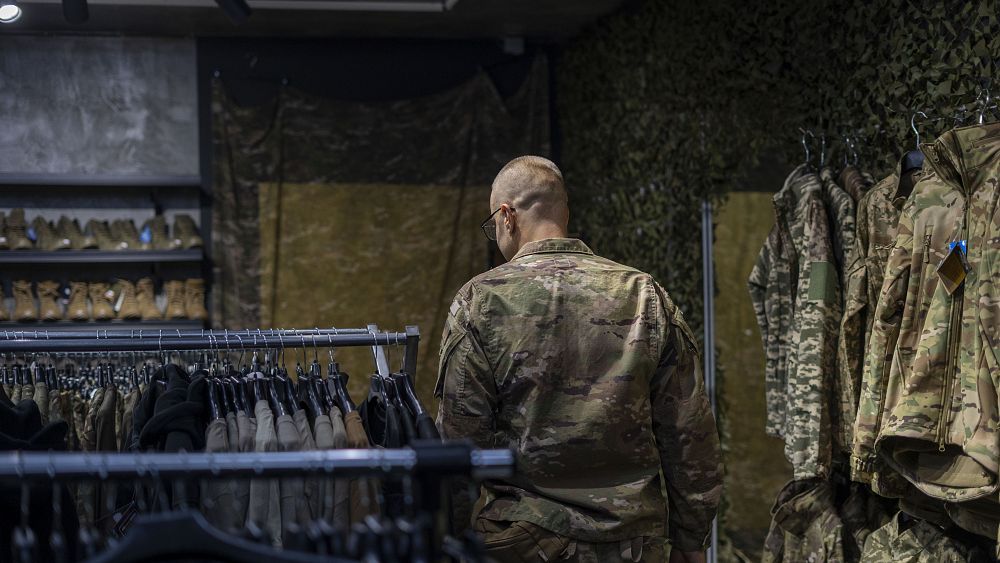Despite the ravages of war, businesses in Kramatorsk, a town located on the front line in the Donetsk region of Ukraine, are showing great resilience.
In a city where damaged buildings are everywhere, a destroyed pizzeria is a painful reminder that lives and livelihoods were wiped out, in an instant.
A Russian ballistic missile struck this popular restaurant in eastern Ukraine in June, killing 13 people, including an award-winning Ukrainian writer and several teenagers. Seven of the victims were staff.
Today, fresh flowers and notes were left where the entrance used to be. A T-shirt, part of the waiters’ uniform, hangs near the makeshift memorial and bears the inscription “We will never forget.”
“As an entrepreneur, I of course regret the loss of property, but there is something that cannot be returned: human lives”says Dmytro Ihnatenko, the owner of RIA Pizza.
The bombed building in Kramatorsk highlights the considerable risks faced by businesses in this frontline town in the Donetsk region. But that hasn’t deterred many other business owners who have reopened their doors to customers, over the past year.
The city council estimates that 50 restaurants and 228 stores are now open in Kramatorsk, three times more than the same period last year. Most of these would be existing businesses that closed at the start of the war and have reopened.
“We understand that this is a risk, and we are taking it because it is our life”says Olena Ziabina, chief administrator of the restaurant, “White Burger”, in Kramatorsk. “Wherever we are, we have to work. We work here. It’s our choice.”
Before the war, the chain, “White Burger” operated mainly in the Donetsk and Luhansk regions. But after Russia invaded Ukraine in February 2022, it was only able to reopen in Kramatorsk. She launched two new restaurants in the capital, kyiv, and in Dnipro, to keep the chain alive.
The Kramatorsk restaurant is the chain’s best performer in terms of profitability, even though prices are 20% lower than those of the capital’s restaurant.
After the attack on the RIA Pizza, the White Burger operators did not consider closing the Kramatorsk restaurant, says Olena Ziabina. “I cried a lot”, she confides, remembering the day she learned of the attack.
Kramatorsk’s economy has adapted to the war. The city is home to the regional headquarters of the Ukrainian army and many cafes and restaurants are frequented mainly by soldiers, journalists and aid workers.
Ukrainian women often go there to meet their husband or boyfriend for a few days.
The soldiers joke that Kramatorsk is their Las Vegas, offering all the “luxuries” they need, like good food or coffee. But restaurants only offer non-alcoholic beer, due to the proximity to the battlefield.
The city streets are virtually empty except for military cars. Residents who remained are avoiding large gatherings and crowded places.
However, the situation is very different from that of the first days of the war, when shops, restaurants and cafes in Kramatorsk were closed. Tens of thousands of people were left unemployed and factories were closed.
“Probably, thanks to the army, we can still come back to this city”confesses Oleksandr, who asked to be identified only by his first name for security reasons.
He is a co-founder of one of the many military stores in Kramatorsk serving soldiers. Oleksandr explains that he only increases prices by 1 hryvnia (3 euro cents) compared to the manufacturer’s price. According to him, the goal is not to make money, but to provide the army with the necessary equipment.
New opportunities bring considerable risks
Many residents welcome the new job opportunities offered by the reopening of stores and restaurants.
But older people have fewer options, as 54-year-old Tetiana Podosionova explains. She worked at the Kramatorsk Machine-Building Plant for 32 years, but the factory closed due to security risks when the war began.
“I hoped to work at the factory until I retired”, explains Tetiana Podosionova. Today, most jobs are in restaurants and stores, where she has no experience.
Eventually, she found a job at the Amazing Fish Aquarium, which resumed operations a few months after the war began. The aquarium has hundreds of exotic fish and dozens of parrots. It remains open to entertain residents, often stressed by missile strikes.
But any resumption of activity carries risks. Ihnatenko, the owner of the pizzeria, still visits his destroyed restaurant every day when he is in Kramatorsk. He does not know why. He looks tired. His voice barely rises above a whisper.
Like many business leaders, he saw Ukraine’s successful counter-offensive in neighboring Kharkiv last year as a sign of a return to life in Kramatorsk.
“It seemed safer here”he emphasizes, standing in the rubble of his restaurant.
He has no plans to rebuild and reopen again.
Her tragic experience shows the difficulties business owners face in keeping their doors open.
“A missile could arrive at any time”he confides.


